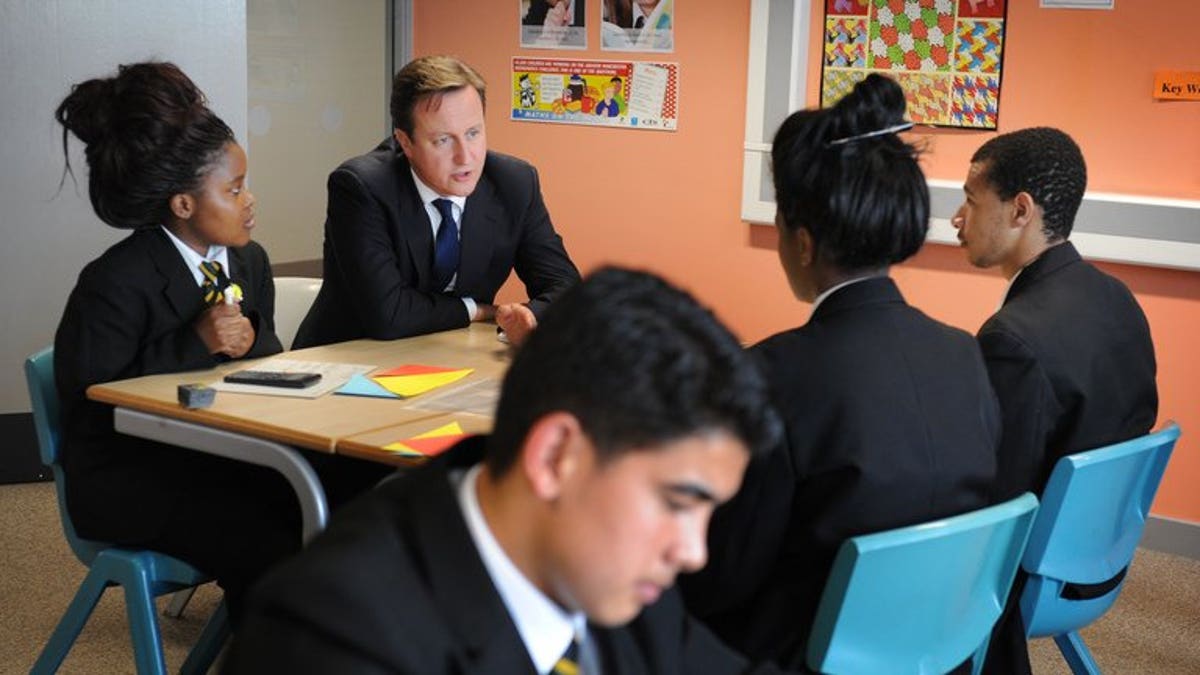
British Prime Minister David Cameron (second left) speaks to students in a mathematics class at Cedar Mount high school in Gorton, Manchester on October 4, 2011. Children will learn to write computer programmes and study internet safety from their first two years of school under a revised national curriculum unveiled Monday. (Pool WPA/AFP/File)
LONDON (AFP) – Children will learn to write computer programmes and study internet safety from their first two years of primary school under a revised national curriculum unveiled Monday.
They will learn basic mathematics, such as fractions, at the same age and will go on to cover a complete chronological history of Britain under the curriculum to be introduced in English state primary and secondary schools from September 2014.
Prime Minister David Cameron hailed the "rigorous" new syllabus, which follows five months of consultation by the Department for Education and Conservative Education Secretary Michael Gove.
"This curriculum marks a new chapter in British education. From advanced fractions to computer coding to some of the greatest works of literature in the English language, this is a curriculum that is rigorous, engaging and tough," Cameron said.
The curriculum has been revised following criticism of previous drafts, with the new history syllabus broadened out after it was criticised for focusing on Britain at the expense of other parts of the world.
Human impact on the climate now features in the geography and chemistry sections after an outcry over its absence from the previous draft, while evolution will be taught to primary school pupils for the first time.
Nine-year-olds will be required to know their times tables up to 12, while secondary pupils will have to study two Shakespeare plays between the ages of 11 and 14.
In design and technology, pupils will use mechanical and electrical systems such as circuits from the age of seven, while the old information technology curriculum is replaced with computing, which places far more emphasis on computer programming.
Secondary schools will be required to own 3D printers, which pupils will operate along with laser cutters and robotics.
Teachers' groups expressed concerns about the tight timeframe of the new plan, with Mary Bousted, general secretary of the Association of Teachers and Lecturers, saying Gove was "risking total chaos in September, with schools unclear about what they need to be planning for".
The Association of School and College Leaders general secretary, Brian Lightman, said: "Our biggest concern is with the timeframe and the lack of resources to prepare for such a major change.
"Pupils and teachers in 2014 are going to have to cope with new GCSEs, new A-levels, new vocational qualifications, new ways of tracking pupil progress... on top of new curriculum content in all subjects. This is a massive change.
"We need the government to publish a full developed educational plan... Our young people shouldn't be treated as guinea pigs in an educational laboratory."
But Gove told ITV's Daybreak the changes "can't come quickly enough".
"I want my children to receive an education as rigorous as any country's," he added.
Academies and free schools can opt out of the National Curriculum but have to follow what officials call a "broad and balanced" curriculum.
Wales, Scotland and Northern Ireland have their own versions of the curriculum.
